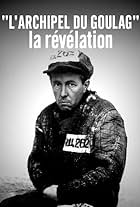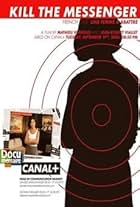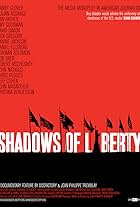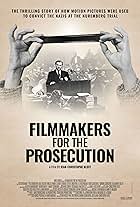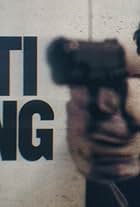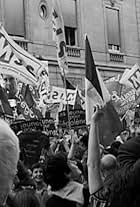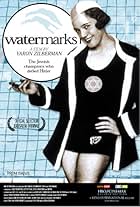Advanced search
- TITLES
- NAMES
- COLLABORATIONS
Search filters
Enter full date
to
or just enter yyyy, or yyyy-mm below
to
to
to
Exclude
Only includes titles with the selected topics
to
In minutes
to
1-50 of 180
- School headmaster Kevin McArevey tries to change the fortunes of an inner-city Irish community plagued by urban decay, sectarian aggression, poverty and drugs.
- Global activists Snowden, Jonsdottir, and Lessig discuss democracy's future, their struggles, its fragility, and potential solutions in a candid conversation amidst Snowden's precarious situation.
- In 1974, Aleksandr Solzhenitsyn's fresco on the Soviet camps sparked a violent awakening to the reality of the regime. Through archives and interviews, we take a fascinating look back at the destiny of this monumental work, which remains a burning issue in Putin's Russia.
- The wife of a notable of the region is found drowned under the Legend Bridge in Sauveterre. Jeanne and Héloïse, childhood friends, must conduct the investigation together. Problem: the daughter of one has divorced the son of the other.
- Inspired by real events. Where is the missing father Albino Rodrigue, who was suppose to pickup his daughter, but never did?
- Powerful rivers flow between the Pyrenees and the Atlantic, known as gaves. Human activity is altering the water cycle and its biodiversity. Men and women look curiously and lovingly at this fascinating world of beauty and disaster.
- A true spy story about the only American citizen who dared stand up to the FBI in an attempt to expose the truth on some specific yet hidden aspects of today's War on Terror and give the American people the protection and security the U.S. government has failed to provide.
- Examines the new media monopoly by corporations in America versus the public battle for truth and democracy.
- A woman wages an uphill struggle to put her life back together in this neo-realist drama from France. Louise is a divorcee in her early fifties who is having a hard time making ends meet on her own, she works as a cleaning woman and lives in her car but raising enough money for an apartment always seems to be just out of her reach.
- 70 years after the liberation of the Auschwitz camp, our eight-part film about the destruction of Europe's Jews sets out to explore a story whose roots go back to before the start of the 20th century, and which is still playing out today.
- The first 1933 - 1978 starts with the Zionist movement and ends with the first re-visitation of that history. The second 1978 - 2005 starts at the beginning of the political wave until the more recent personal cinema. However chronological, both episodes cover most of the genres, themes and periods of Israeli cinema - from the beginning of the Zionist Mouvement to the most personal stories - from commercial to politically engaged directors, from the local to the universal. A HISTORY OF ISRAELI CINEMA tells the story of the building of a gaze on a society torn by ethnics, religious, and political conflicts. It attempts to understand, to denounce or to explore this complex subjects, always searching for the right ethic, the right form: to explore or transform its own definition and its place in the world.
- In the early days of the system, that came to be known as Capitalism, political economists of all stripes struggled to understand the laws that govern the flow of capital - and of Capitalism's related activities. As a result, a critical assessment and sketchy understanding of how Capitalism worked began to emerge. But in recent times, as the system, and the world, has grown a hundredfold more complex we have veered away from the pursuit of any clear, critical understanding of the phenomenon. Economic departments in most major universities in the English-speaking world have abolished courses in the history of Economic and political economy. We are left with incomprehensible mathematical models whose relevance to the real world is hotly disputed. We were told very little about Adam Smith, David Ricardo and Thomas Malthus yet their names have been used to give legitimacy to contemporary economic activities. To further obscure the issues, this « econo speak » has been supplemented by endless superficial news reports, pundits discussions and analysis filled with clichés and superficial information. Our series intends to puncture this veil of opacity to go beyond the current « econo- speak » to re examine the ideas which have been used in the past 40 to reshape the world. Is today's economic crisis a temporary blimp on the road to progress or a symptom of a deeper crisis of the system as a whole? Can the big ideas of the at the heart of our Economic system help us understand today's economic crisis, or obscure it? And more importantly - can they show us a way out?
- In the summer of 1945, the American authorities instructed two young soldiers, Budd and Stuart Schulberg, to gather visual evidence attesting to Nazi crimes, with a view to the trial against twenty-four dignitaries of the Third Reich which was preparing for Nuremberg. The sons of an eminent producer, already experienced in the cinema business, they must (under the aegis of filmmaker John Ford, head of the Office of Strategic Services, OSS) support the accusation of chief prosecutor Robert Jackson. In four months of high-risk investigation across devastated Europe, the Schulbergs manage to save hundreds of hours of footage, much of it taken by the Nazis, from destruction. Their editing team then worked tirelessly to complete before the opening of the trial on November 21, 1945, films exposing the atrocities perpetrated after Hitler's seizure of power, from the first pogroms to the concentration camp system, and their premeditated nature. Without the help of his brother, who has resumed his work as a screenwriter in the United States, Stuart Schulberg is then responsible, alongside the Soviet Roman Karmen, for filming the main stages of the procedure, a first in the history of justice. . They are only allowed to shoot thirty-five hours of rushes over more than ten months of hearings, but the sound recordings of the entire proceedings will allow Stuart to produce Nuremberg: its Lesson for Today, a documentary that the American authorities, facing to Cold War emergencies, finally decide to bury in 1948.
- Zylberman tells the story of a building in rue Saint-Maur during the German occupation of Paris through the memories of those who lived there and survived the war.
- In Georgia a man in his 40s, Levan, is waiting in a clinic for an MRI examination. He needs to find out what's causing the pain in his shoulder. He's nervous. By the time he leaves the hospital he's not the same man. His anxiety quickly spreads to his wife and well-meaning friends. The family courtyard becomes the scene of an informal advisory council, where everybody suggests magical cures and must-see specialists. Soon Levan's savings are gone. He's scared of losing his job, his heath and his wife, who has started to come home later and later. But suddenly, out of nowhere - a serendipitous event occurs.
- The story of the terrible tragedy of Vincent Lambert, who lived in a vegetative state for 11 years.
- Roxana is a young Romanian nanny looking after 8-year-old Georges, the son of David and Elizabeth. David's a financier at the European Bank of Strasbourg. Working on a project for a motorway across Romania, David asks Roxana for some help.
- Burning Out is literally a drama about life and death. For two years, the Belgian director Jérôme le Maire followed the members of a surgical unit in one of the biggest hospitals in Paris. Constantly under severe stress, understaffed and subject to severe budget cuts, employees fight each other for resources. Meanwhile the management imposes ever more stringent efficiency and profitability targets. All over Europe burnout has reached epidemic proportions among employees in the public and private sectors. Will we end up killing ourselves? Or will we be able to find meaning and joy at work?
- Revisits the two rounds of the 2007 French presidential election (April 22 and May 6, 2007), where Conservative leader Nicolas Sarkozy won a clear victory over his Socialist opponent, Ségolène Royal. Faced with the activist, the journalist, the political figure and the gigantic media device set up for the occasion, the audience is taken on board without real or comprehensive explanations. Strangely, the chaos seems organized. Just like when we are considering the range of 'unplanned' events that get media exposure, so much so that we wonder if they really are being planned. Is all this period of unrest visibly set in motion by social activists, agitators, ordinary people, politicians, publicity agents?
- The story of the Hakoah Vienna Jewish womens swim team of the 1930s, their forced separation, and their reunion decades later.
- A feminist legend, a May 68 activist, a famous playwright and poet, Hélène Cixous is the vehicle of this road movie. With friends like the philosopher Jacques Derrida, the artist Adel Abdessemed, with Ariane Mnouchkine and her cosmopolitan theatre company, Cixous explores the wounds our time and allows us to ear the cry of literature. The history of dozens of members of her German-Jewish family who were assassinated in the Death Camps, and the trauma of the wars of decolonization are never far, for this major figure who was born in Algeria shortly before the start of the Second World War.
- Jean-Emmanuel Godart directs his first feature-film "Big House". French and English movie co-production shot in NYC.


